Microsoft Outlook How To Create Distribution List
Our Verdict
Outlook is a sleek and flexible email client that offers a deep set of tools and unparalleled convenience for anyone involved in Microsoft's ecosystem.
For
- Helpful integrations and add-ons
- Decent set of free features
- Perfect for Microsoft 365 users
Against
- Desktop app and other features only available to paid users
TechRadar Verdict
Outlook is a sleek and flexible email client that offers a deep set of tools and unparalleled convenience for anyone involved in Microsoft's ecosystem.
Pros
- + Helpful integrations and add-ons
- + Decent set of free features
- + Perfect for Microsoft 365 users
Cons
- - Desktop app and other features only available to paid users
In our Microsoft Outlook review, we check out the pros and cons of the platform relative to Gmail, Apple Mail, and more of the best email clients. With an intuitive interface, robust feature set, free access, and availability on most popular devices, Outlook is one of our top recommendations if you're looking for a new email client.
This is especially as email is one of the most ubiquitous forms of communication worldwide, with more than half the global population having an email account in 2019. While Microsoft Outlook isn't as widespread as Gmail or Apple Mail, market research indicates that it's still the third most popular option.
- You can sign up for Microsoft Outlook here.
Microsoft Outlook: Plans and pricing
Like Gmail, Apple Mail, Yahoo Mail, and other popular email clients, Microsoft Outlook is entirely free to use. That said, you may want to pay for additional storage space and a few advanced features, and Microsoft's pricing is a little confusing if you're new to the ecosystem.
Even though Outlook is free to access online, the desktop app is listed for an exorbitant $139.99 on the Microsoft website. This is likely because Microsoft is trying to direct users toward the new Microsoft 365 subscription, which bundles Outlook with its other productivity tools, like Excel, Word, PowerPoint, and OneDrive.
Microsoft supports free Outlook access with ads, which you'll see in your inbox until you upgrade to Microsoft 365. Free users are also limited to 15 GB of mailbox storage and 5 GB of OneDrive storage.
Microsoft 365 Personal costs $6.99 per month or $69.99 per year and includes 50 GB of mailbox storage, 1 TB in OneDrive, access to the desktop apps on Mac and Windows, message encryption, custom domain names, and more. Family plans are available for $9.99 per month or $99.99 per year, offering the same features for groups of up to six users.
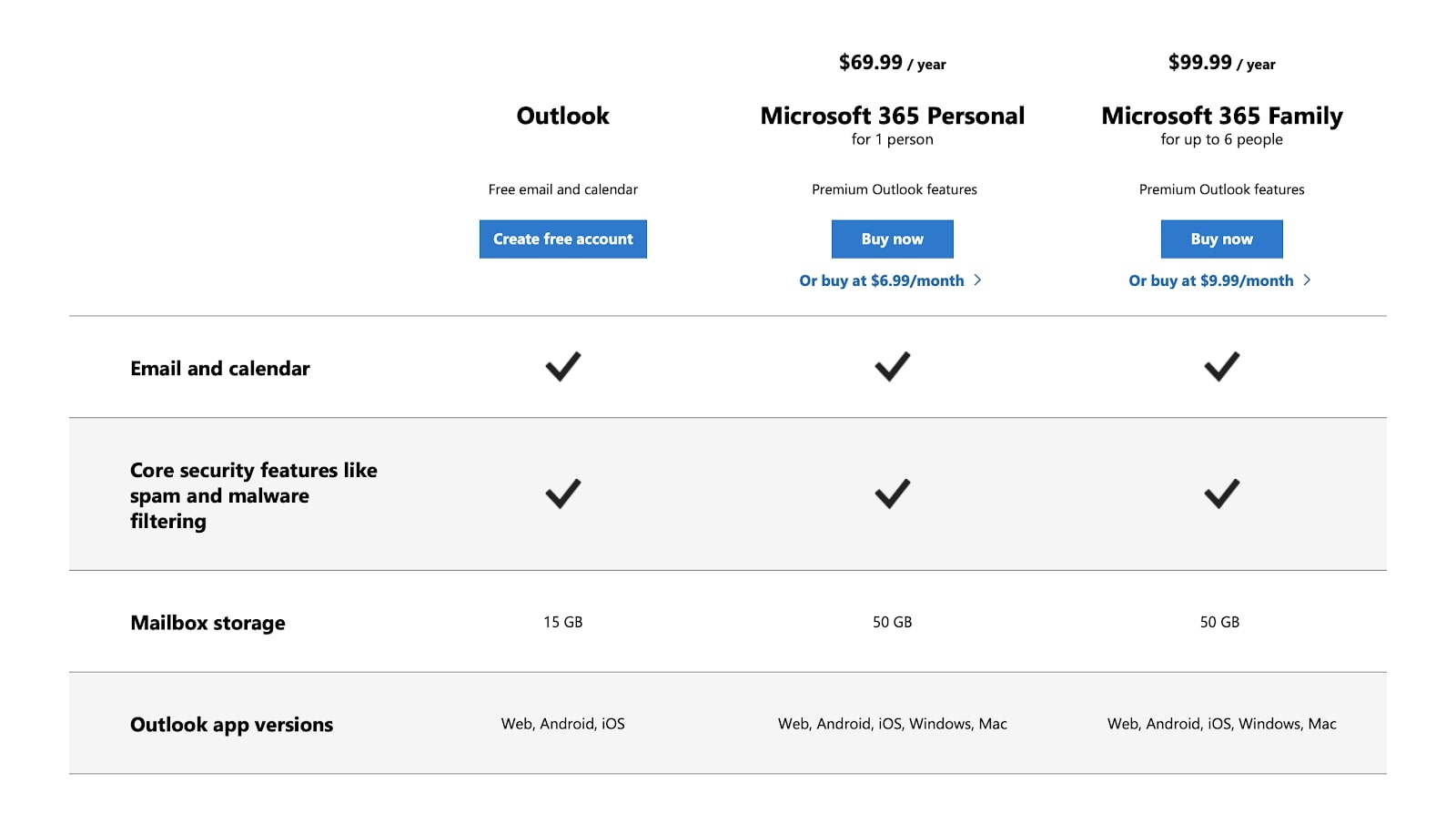
Microsoft Outlook: Features
Outlook has everything that you would expect from a free email client, and the Microsoft 365 subscription introduces several additional tools. Along with 15 GB of storage, free users also get basic tools like spam and malware blockers and the option to create custom folders for certain types of messages.
Microsoft Outlook also comes with support for groups. Outlook groups can access a shared mailbox, set up shared events, and send emails from a shared address. Unsurprisingly, the application integrates seamlessly with other Microsoft 365 apps, like Excel and Word, as well as third-party platforms, such as Trello and Dropbox.
Dropbox, for example, has a free add-in for Outlook that makes it easy to send attachments as sharing links or automatically download attachments to your Dropbox account. Integrating your Outlook account with Dropbox and other apps can streamline nearly every aspect of your workflow.
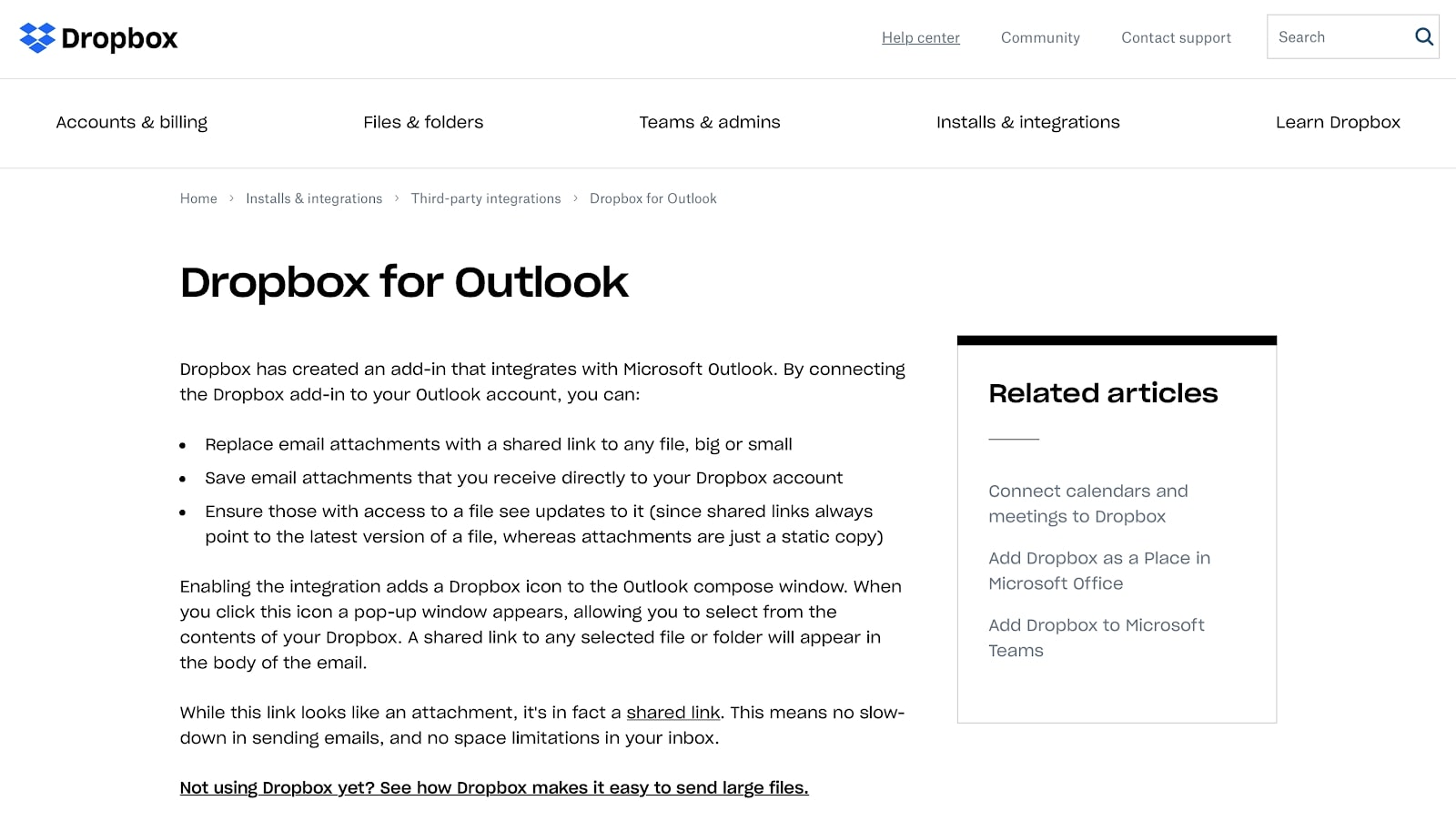
Microsoft Outlook: Interface and in use
Like other popular pieces of free office software, Outlook opts for a clean, straightforward design that's simple and easy to use. This starts with a default division of your inbox into Focused and Other, with Focused representing the most important messages. Outlook learns from your behavior, so you can always mark a message for the other inbox if it was sorted incorrectly.
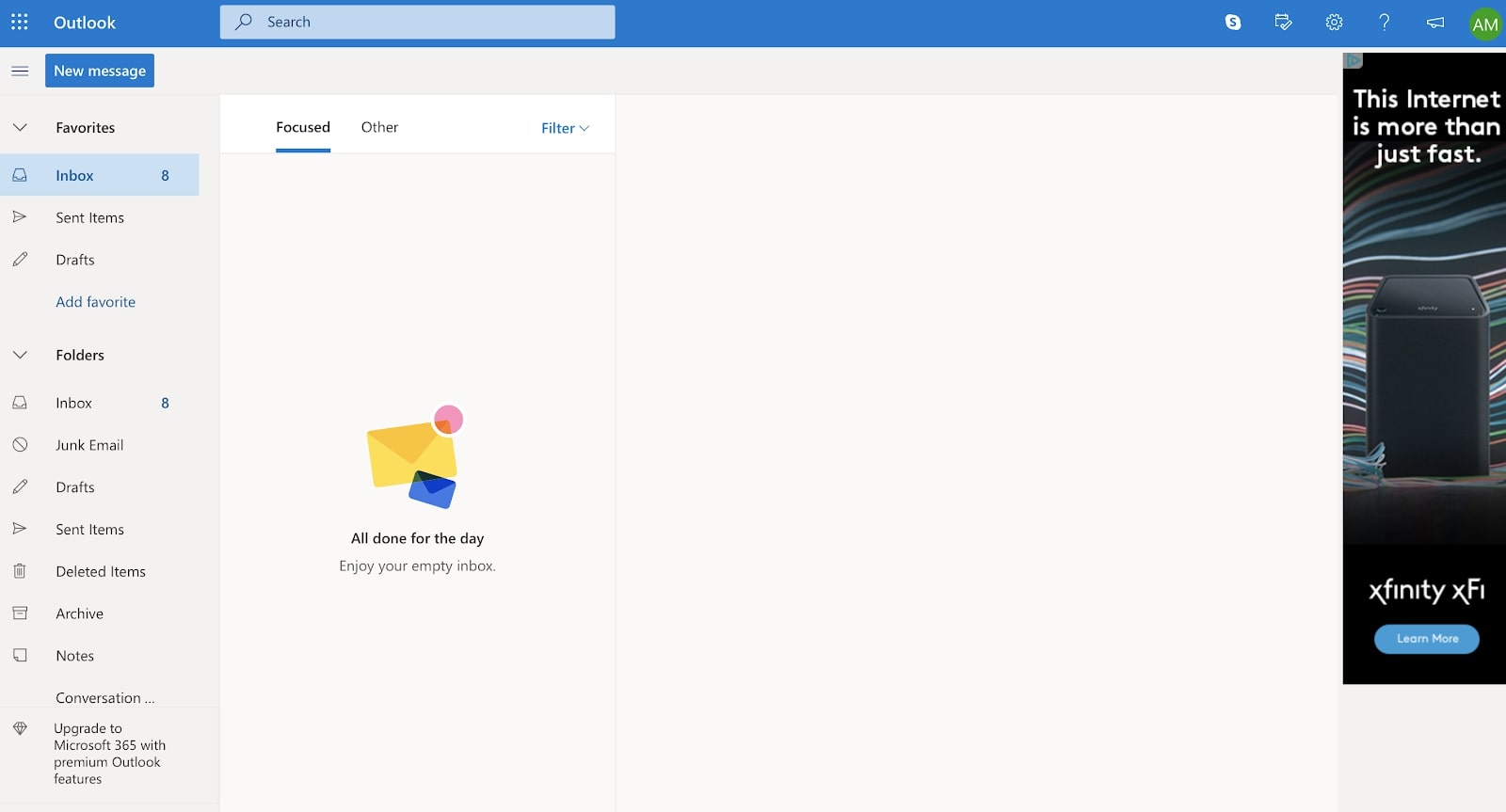
While Outlook performs well on mobile devices, it's unfortunate that the desktop app is only available to paid subscribers. The web interface may be more convenient for some users, and it comes with most of the same features and capabilities, but certain advanced tools are limited to desktop use. For example, Quick Steps—which automates repetitive tasks, like forwarding messages or moving them to a particular folder—is only available in the desktop app.
Microsoft Outlook: Support
If you run into any issues with Outlook, click or tap the question mark icon for more information. From there, you'll have access to a searchable database of support articles covering most of the program's key features and settings.
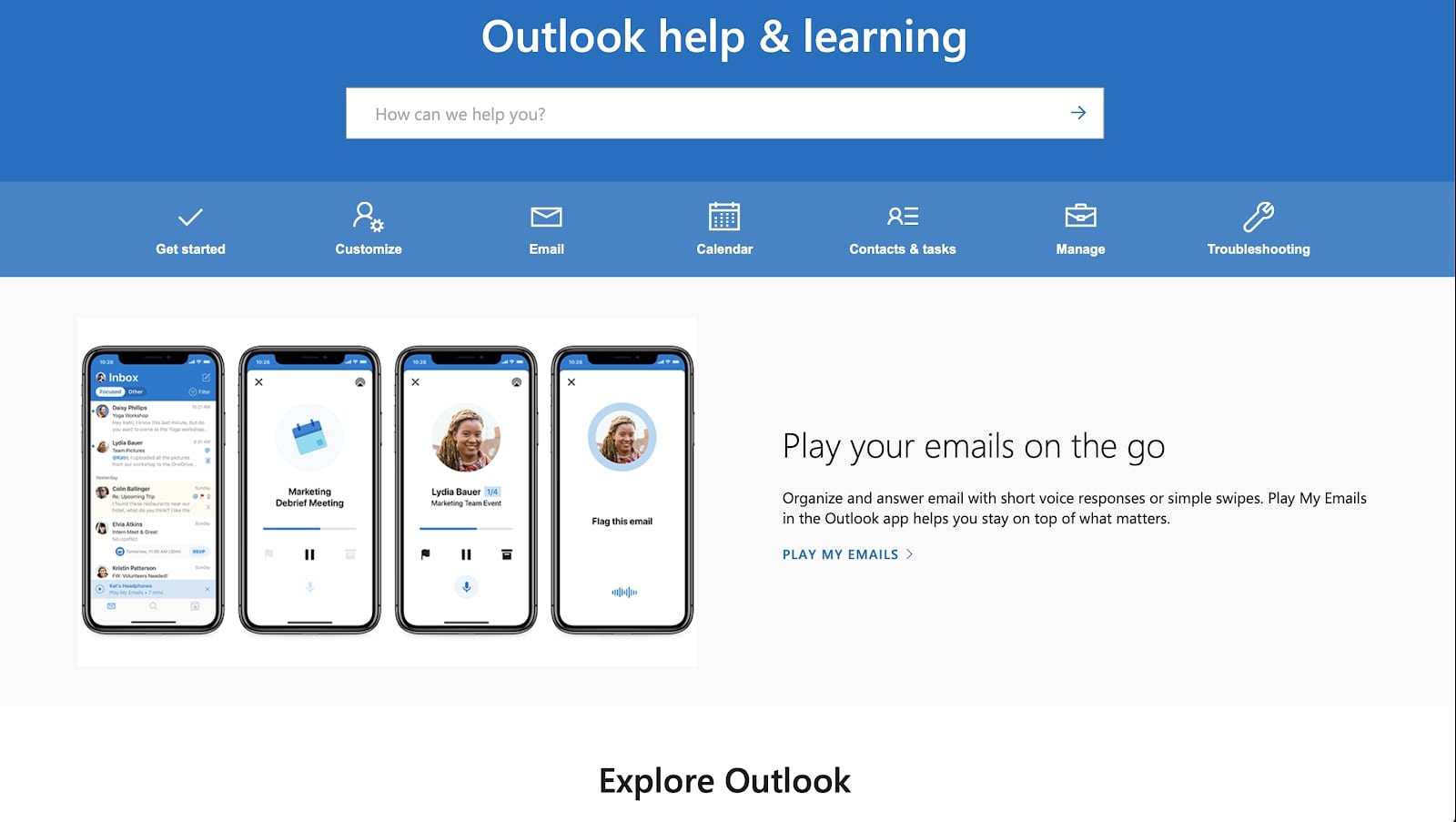
While Microsoft advertises tech support as one of the perks associated with a Microsoft 365 subscription, you don't need to be a paying subscriber to get help with Outlook. Phone support and other options might not be available, but we were able to get in touch with an agent almost immediately via live chat.
Microsoft Outlook: Security
Your Outlook account is tied to your Microsoft account, and Microsoft was associated with a relatively high-profile breach in 2019. Of course, any company could be targeted, and there isn't any reason to think that Microsoft is particularly vulnerable. Still, you should take the time to activate two-step authentication on your account for additional security.
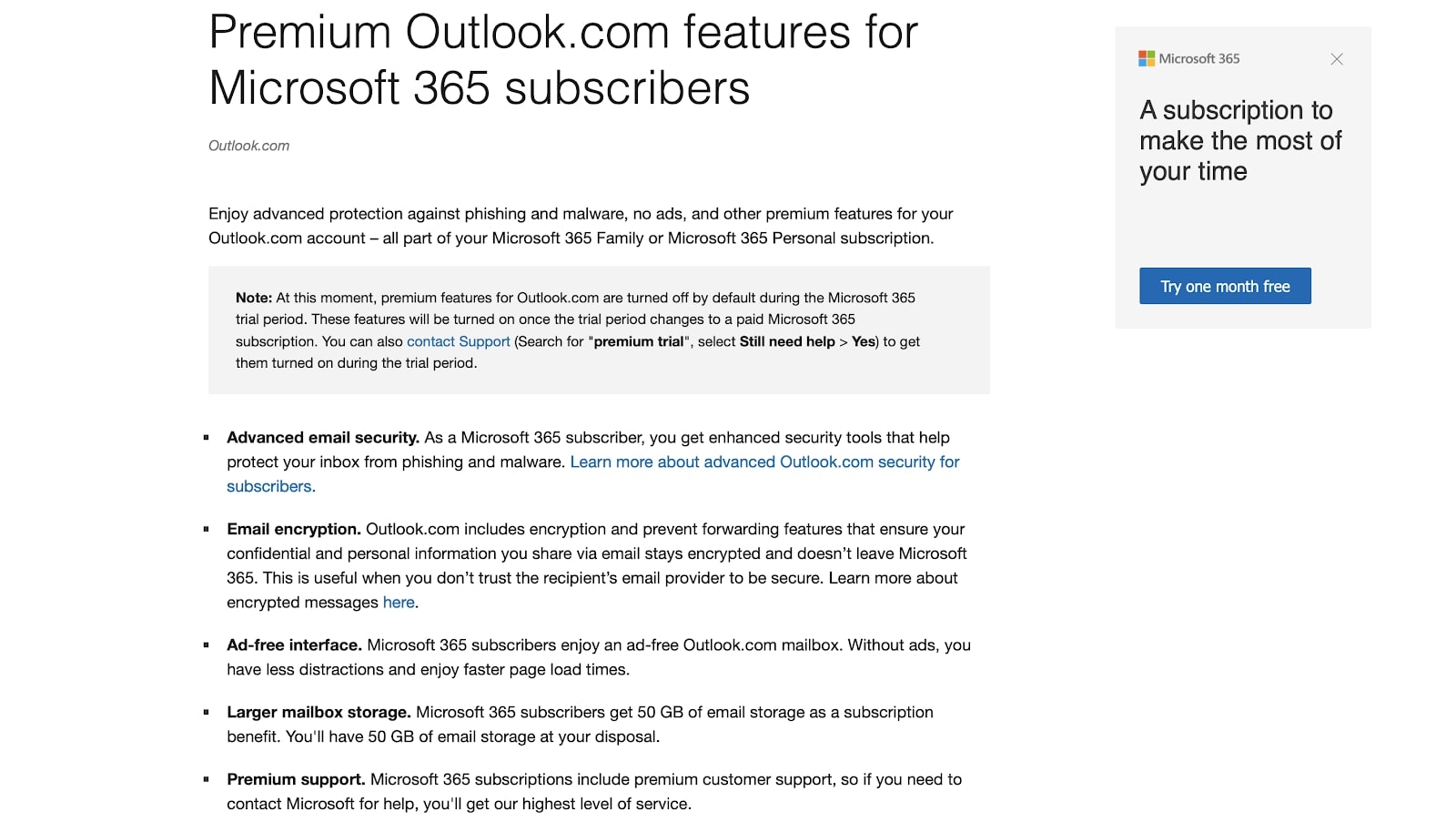
Unfortunately, certain critical security features are locked behind the Microsoft 365 paywall. For example, Outlook won't check attachments or links for threats unless you pay for the subscription. Similarly, email encryption and forwarding prevention aren't available on free accounts.
The competition
While there are a few key differences between Outlook and its top competitors, it matches most of the core features of Gmail, Yahoo Mail, and Apple Mail. The free version offers more than enough for most individual users, and Microsoft 365 subscriptions are relatively similar to paid iCloud and Google Workspace plans.
That said, some users may prefer certain aspects of other email clients, such as Apple's free desktop app or Gmail's simple, classic design. Ultimately, the right email client for you depends on your unique needs and preferences. Check out the best Microsoft Office alternatives if you're interested in learning more about other top providers.
Final verdict
Outlook is not as popular as Gmail or Apple Mail, but it still has a professional interface, availability on a variety of devices, and a solid set of free features. The extra tools available with Microsoft 365 subscriptions add to the platform's capabilities, especially when combined with its deep library of add-ons.
While users who are already invested in the Google or Apple ecosystem might not be motivated to switch, Outlook is particularly convenient for anyone who frequently uses Word, PowerPoint, Excel, OneDrive, or another Microsoft productivity tool. Overall, it's one of the best all-around email clients available at present.
- You can sign up for Microsoft Outlook here.

Alex is a writer focused on providing insightful, actionable content that can truly change the way readers approach their finances. Alex has been writing as a freelancer for several years on a variety of topics including marketing, parenting, and customer relationships along with personal finance. He's particularly interested in the way seemingly small adjustments can transform a person's financial outlook.
Microsoft Outlook How To Create Distribution List
Source: https://www.techradar.com/reviews/microsoft-outlook
Posted by: hughesthind1949.blogspot.com

0 Response to "Microsoft Outlook How To Create Distribution List"
Post a Comment